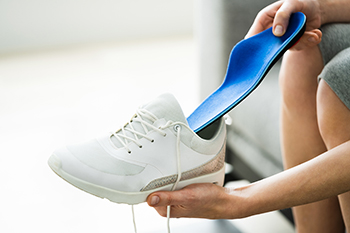Types of Orthotics
Tuesday, 21 March 2023 00:00
Many people wear orthotics as part of a treatment plan for specific foot conditions. They may be helpful in providing support to the ankle, and in possibly correcting foot deformities. They are defined as customized heel or foot inserts that are designed to fit the feet, based on the individual’s needs. Existing foot conditions that may benefit from wearing orthotics can include arthritis, bunions, diabetes, and flat feet. The materials orthotics are made from can range from rigid to flexible, and the choice is made depending on what the foot condition is. The effectiveness of wearing orthotics is based on how often they are worn, what kind of shoe they are going in, and how well they are made. If you are interested in learning more about wearing orthotics, it is suggested that you consult a podiatrist who can determine which type is best for you.
If you are having discomfort in your feet and would like to try orthotics, contact Dr. Anna Petrov from Family Foot & Ankle Care. Our doctor can provide the care you need to keep you pain-free and on your feet.
What Are Orthotics?
Orthotics are inserts you can place into your shoes to help with a variety of foot problems such as flat feet or foot pain. Orthotics provide relief and comfort for minor foot and heel pain but can’t correct serious biomechanical problems in your feet.
Over-the-Counter Inserts
Orthotics come in a wide variety of over-the-counter inserts that are used to treat foot pain, heel pain, and minor problems. For example, arch supports can be inserted into your shoes to help correct overarched or flat feet, while gel insoles are often used because they provide comfort and relief from foot and heel pain by alleviating pressure.
Prescription Orthotics
If over-the-counter inserts don’t work for you or if you have a more severe foot concern, it is possible to have your podiatrist prescribe custom orthotics. These high-quality inserts are designed to treat problems such as abnormal motion, plantar fasciitis, and severe forms of heel pain. They can even be used to help patients suffering from diabetes by treating foot ulcers and painful calluses and are usually molded to your feet individually, which allows them to provide full support and comfort.
If you are experiencing minor to severe foot or heel pain, it’s recommended to speak with your podiatrist about the possibilities of using orthotics. A podiatrist can determine which type of orthotic is right for you and allow you to take the first steps towards being pain-free.
If you have any questions please contact one of our offices located in Wheeling and Chicago, IL . We offer the newest diagnostic and treatment technologies for all your foot and ankle needs.







